The bombardment against the rebel-held suburb of the Syrian capital Damascus continued on Saturday despite a ceasefire agreement reached a day earlier between the opposition and regime at the Vienna peace talks.
Five bombardments targeted Eastern Ghouta overnight, including with rocket strikes and artillery shells, said the Britain-based Syrian Observatory for Human Rights.
No ceasefire was formally announced by Russia or the Syrian regime, whose forces have besieged the enclave outside Damascus for years and has stepped up its bombardment there in recent months.
A ninth round of UN-sponsored peace talks ended in Vienna on Friday without result.
Ayman al-Asemi, a member of the Free Syrian Army’s military council, said late on Friday that Russia had made a pledge to opposition negotiators in Vienna that it would press Damascus to enforce a ceasefire in Eastern Ghouta.
However, Nasser al-Hariri, head of the opposition delegation in Vienna, did not mention Eastern Ghouta or any ceasefire agreement during a news conference on Saturday.
The Vienna talks ended with the opposition saying it would not attend a Syrian peace congress that Russia is holding next week in Sochi.
Hariri said the decision not to attend was made after a vote among the opposition groups that form the delegation and that he hoped the Sochi meeting would still prove useful. He said Russia had not put pressure on the delegation to attend.
"The regime doesn't believe in a political solution and it will not believe in the future ... it only believes in the military option," he added.
International concern has been rising over the fate of Eastern Ghouta, where the United Nations says acute food and medicine shortages have contributed to the worst malnutrition seen in the Syrian war.
The enclave is home to almost 400,000 people and is in an agreed “de-escalation zone” under Russian-led truce deals for rebel-held territory, but the fighting there has continued.









